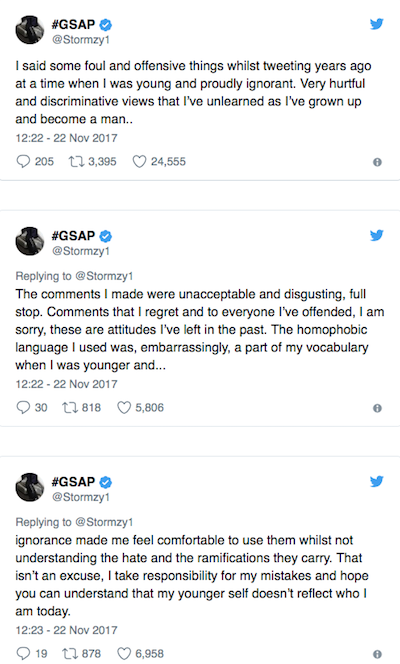MMF Guide: Social Media Best Practice
With established and upcoming artists alike using social media as a vital tool for direct-to-fan communication, being wary of what is hidden in the archives of your artists’ pages is essential. More and more frequently artists are feeling the sting of backlash after an unsavoury Facebook post, tweet or comment is re-surfaced from years gone by.
This past November, Stormzy came under fire after homophobic tweets from between 2011-14 were brought to light. X-Factor winner Louisa Johnson is the latest public figure to be questioned after posts from when she was still at school circulated Twitter. From a fan perspective, seeing an artist being overtly offensive is likely to affect your opinion on them and as a result, their music. So, what can managers do to make sure that their artists evade such a ‘trial by social media’?
Managers should be aware that taking a social media-heavy artists’ career to the next level means new exposure – new fans are unlikely to separate an artists’ old prejudices from the artist they’ve evolved to today. Guaranteeing that your artists’ pages are ‘clean’ therefore, is essential. Going forward, artists should ensure that content they are pushing on their social media pages is appropriate and non-offensive. For example, asking yourself if you’d be happy for your parents/boss/colleagues to see a post before posting it.
MMF Board member and Ferocious Talent manager Kwame Kwaten advises that before signing an act, or when scouting potential talent, that managers come up with a list of offensive terms to search existing social media for. In addition, asking artists directly opens up a conversation about appropriate social media use. This way, managers can avoid backlash for their artists’ old content from the get-go. Kwaten also points out that should this trend of social media backtracking continue, artists could expect to see added clauses in their management agreements meaning they have to declare that their social media is clear of defamatory content or make it so before signing. Here are some tips on how to achieve this:
- Twitter allows the function of downloading an accounts’ archive (the entire tweet catalogue) which can then be deleted in bulk or individually using third-party websites. For example, free-to-use Cardigan
- Alternatively, using the Search tool on Twitter itself will show you all the tweets with a particular term in. Type ‘[term here] from:[your account’s username]. For instance:

- You can then delete all of the tweets using that term without having to sift through your entire history.
- Thanks to Facebook’s layout, it is easy to head back in time by month or year to find contentious older posts.
- On any Facebook page, clicking ‘Activity Log’ will provide a page with a timeline on the right-hand side, allowing you to go back year-by-year. This function lists every post/comment/like an account has made:

- Use Ctrl+F to search your Facebook history for offensive words so that you don’t have to manually look through every post.
- The grey pencil in the above photo allows you to delete posts easily.
Instagram and other image-based platforms
- When sharing images or updating Stories, ask “Would I be happy for my boss and my parents to see this?”
- Platforms with the function to host livestreaming come with their own problems, especially as they do not give you the ability to delete something you’ve said verbally – once it’s been broadcasted, it’s public.
Ultimately, what managers do not want to happen is for someone to spot your artists’ violating content and spread it on further through screenshots, discussion and content of their own. Because once it’s a photo accessible by many people, or viral, it becomes immortalised and potentially a permanent stain on your artists’ brand.
However, if this does happen, the crisis management following is just as important as the prevention. Typically, when an artist receives backlash on social media, they quickly delete the tweet, release an apology and hope for the best. Most of the time the ‘scandal’ passes, but due to the fact that so many artists have been through this routine, this way of apologising has become uniform and somewhat impersonal. Here are some tips to ensuring that your artists come through unscathed:
- The wording of the apology is key and Stormzy’s apology tweets are ample examples of how to do it – he takes full responsibility and has shown real change from the person he was when he made homophobic comments in the past.

- A video apology might be most effective due to it being a more personal way of communicating with your fanbase (and is far less common)
- If a particular minority group was mentioned in the violating content, take steps to address this group directly rather than making a general apology. For example, Louisa Johnson teamed up with Attitude Magazine (an LGBTQ publication) for a sit-down interview after receiving her backlash and is set to perform at many LGBTQ events across the year. Showing commitment to a group that you’ve previously spoken ill of is a step in the right direction and sends the strongest message.